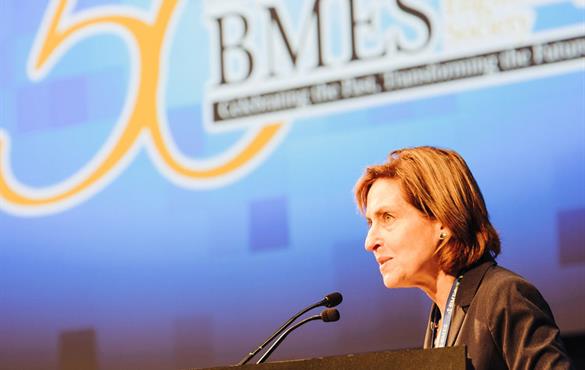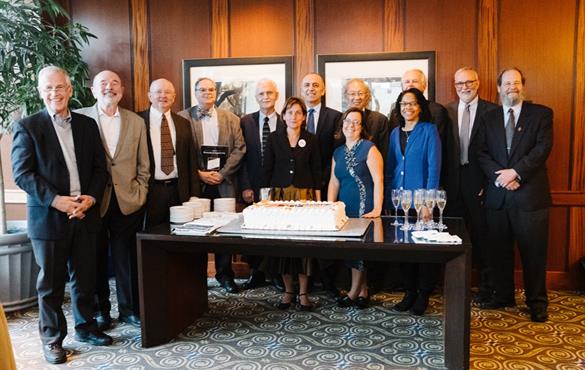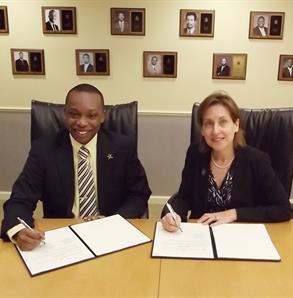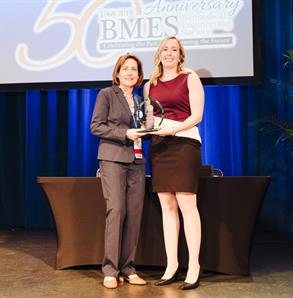Setton's tenure as BMES president highlighted by landmark celebration, new award
As Lori Setton wraps up her tenure as president of the Biomedical Engineering Society, she looks back at all that she's achieved during her two-year term

After serving as president of the Biomedical Engineering Society (BMES) for two years, Lori Setton, the Lucy & Stanley Lopata Distinguished Professor at Washington University in St. Louis, is prepared to step aside.
“Two years — plus the preceding president-elect period — is a good amount of time to achieve a few focused projects, and I think I did that.” Setton said.
Setton joined the faculty at the School of Engineering & Applied Science in 2015. In 2016, she was elected president of BMES, and in 2017, she was named chair of the Department of Biomedical Engineering. As president of BMES, she joins a prestigious group of biomedical engineers to serve in that role, including Frank Yin, MD, former department chair, who was BMES president in 2005-06 and has served on its board of directors.
Celebrating 50 Years
 With more than 7,000 members, BMES is the premier organization for biomedical engineering professionals in the United States. Not only did Setton need to manage the regular business of an organization that large, she also led the committee that organized the Society’s 50th-anniversary celebration.
With more than 7,000 members, BMES is the premier organization for biomedical engineering professionals in the United States. Not only did Setton need to manage the regular business of an organization that large, she also led the committee that organized the Society’s 50th-anniversary celebration.
“BME and bioengineering emerged from communities of physicists, electrical engineers and mathematicians starting in 1968, who got together to talk about physiology and biology,” she said. "It really was extraordinary for these founders to find each other and to find a community of peers with whom they could share their passion and otherwise ‘crazy’ ideas.”
The yearlong celebration included special challenges, workshops and symposia, a time capsule donated by Clemson University and a digital timeline highlighting important moments in the Society’s history. Sponsored by Washington University, the timeline features photographs of people and events in the Society’s history. During the organization's 2018 annual meeting, the Society hosted an anniversary reception for the organization’s major contributors, including the Whitaker Foundation and Coulter Foundation.
According to Setton, both the timeline and the time capsule “generated unprecedented levels of interest in BMES and were a big leap forward for the Society.”
A New Partnership
 As part of a commitment to increase diversity and inclusion in the engineering student body, Setton signed a historic agreement with the National Society of Black Engineers (NSBE).
As part of a commitment to increase diversity and inclusion in the engineering student body, Setton signed a historic agreement with the National Society of Black Engineers (NSBE).
Under the terms of the arrangement, BMES will partner with NSBE to support the goal of graduating 10,000 black engineers by 2025, as well as offering discounted membership to NSBE members and supporting NSBE member travel to the Society’s annual meeting.
Already, the Society has generated $60,000 in National Institutes of Health (NIH) and National Science Foundation (NSF) funding to increase the participation of minorities in the organization and another $35,000 from the United Engineering Foundation to develop materials for students in grades three through six from select regions across the country.
“No one is more excited to engage a broader constituency in biomedical engineering than our educators, employers and Society leaders,” Setton added.
Recognizing Rising Leaders
 And Setton is committed to identifying and preparing the industry’s next generation of leaders. That’s part of the reason she promoted the Society’s Mid-Career Award, which honors the achievements of academics 10 to 20 years into their careers.
And Setton is committed to identifying and preparing the industry’s next generation of leaders. That’s part of the reason she promoted the Society’s Mid-Career Award, which honors the achievements of academics 10 to 20 years into their careers.
“The mid-career period is when tomorrow’s leaders will begin to emerge, those that are prepared to lead in the future,” Setton said. “Everyone looked to the Mid-Career Award as a way for the Society to identify those who can take all of us to the next level.”
The award recipient receives free registration for the Society’s annual meeting, a crystal plaque, an honorarium of $5,000 and travel expenses up to $1,000.
Following her tenure as president, Setton will serve another term as past-president as a resource to the incoming president, Dawn Elliott from the University of Delaware. Her advice for the incoming president? Listen to her staff.
“They have the history and the breadth of experience to see where change is needed and to know how to make change,” Setton said. “They need the support and empowerment that only the president can give.”




